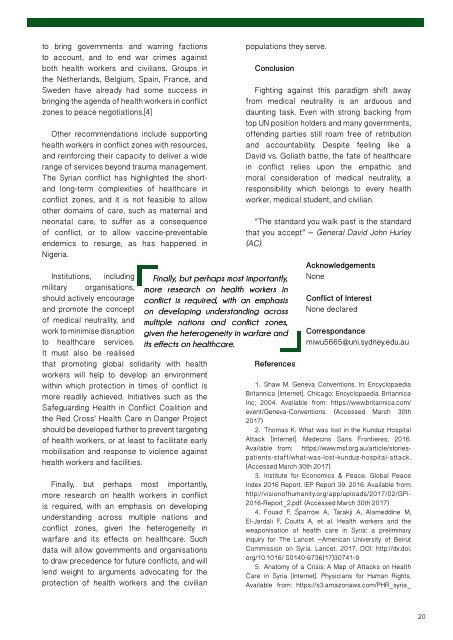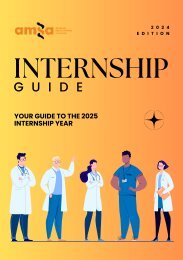Vector Volume 11 Issue 1 - 2017
Create successful ePaper yourself
Turn your PDF publications into a flip-book with our unique Google optimized e-Paper software.
to bring governments and warring factions<br />
to account, and to end war crimes against<br />
both health workers and civilians. Groups in<br />
the Netherlands, Belgium, Spain, France, and<br />
Sweden have already had some success in<br />
bringing the agenda of health workers in conflict<br />
zones to peace negotiations.[4]<br />
Other recommendations include supporting<br />
health workers in conflict zones with resources,<br />
and reinforcing their capacity to deliver a wide<br />
range of services beyond trauma management.<br />
The Syrian conflict has highlighted the shortand<br />
long-term complexities of healthcare in<br />
conflict zones, and it is not feasible to allow<br />
other domains of care, such as maternal and<br />
neonatal care, to suffer as a consequence<br />
of conflict, or to allow vaccine-preventable<br />
endemics to resurge, as has happened in<br />
Nigeria.<br />
Institutions, including<br />
military organisations,<br />
should actively encourage<br />
and promote the concept<br />
of medical neutrality, and<br />
work to minimise disruption<br />
to healthcare services.<br />
It must also be realised<br />
that promoting global solidarity with health<br />
workers will help to develop an environment<br />
within which protection in times of conflict is<br />
more readily achieved. Initiatives such as the<br />
Safeguarding Health in Conflict Coalition and<br />
the Red Cross’ Health Care in Danger Project<br />
should be developed further to prevent targeting<br />
of health workers, or at least to facilitate early<br />
mobilisation and response to violence against<br />
health workers and facilities.<br />
Finally, but perhaps most importantly,<br />
more research on health workers in conflict<br />
is required, with an emphasis on developing<br />
understanding across multiple nations and<br />
conflict zones, given the heterogeneity in<br />
warfare and its effects on healthcare. Such<br />
data will allow governments and organisations<br />
to draw precedence for future conflicts, and will<br />
lend weight to arguments advocating for the<br />
protection of health workers and the civilian<br />
populations they serve.<br />
Conclusion<br />
Finally, but perhaps most importantly,<br />
more research on health workers in<br />
conflict is required, with an emphasis<br />
on developing understanding across<br />
multiple nations and conflict zones,<br />
given the heterogeneity in warfare and<br />
its effects on healthcare.<br />
Fighting against this paradigm shift away<br />
from medical neutrality is an arduous and<br />
daunting task. Even with strong backing from<br />
top UN position holders and many governments,<br />
offending parties still roam free of retribution<br />
and accountability. Despite feeling like a<br />
David vs. Goliath battle, the fate of healthcare<br />
in conflict relies upon the empathic and<br />
moral consideration of medical neutrality, a<br />
responsibility which belongs to every health<br />
worker, medical student, and civilian.<br />
“The standard you walk past is the standard<br />
that you accept” – General David John Hurley<br />
(AC).<br />
References<br />
Acknowledgements<br />
None<br />
Conflict of Interest<br />
None declared<br />
Correspondance<br />
miwu5665@uni.sydney.edu.au<br />
1. Shaw M. Geneva Conventions. In: Encyclopaedia<br />
Britannica [Internet]. Chicago: Encyclopaedia Britannica<br />
Inc; 2004. Available from: https://www.britannica.com/<br />
event/Geneva-Conventions. (Accessed March 30th<br />
<strong>2017</strong>)<br />
2. Thomas K. What was lost in the Kunduz Hospital<br />
Attack [Internet]. Medecins Sans Frontieres; 2016.<br />
Available from: https://www.msf.org.au/article/storiespatients-staff/what-was-lost-kunduz-hospital-attack.<br />
(Accessed March 30th <strong>2017</strong>)<br />
3. Institute for Economics & Peace. Global Peace<br />
Index 2016 Report. IEP Report 39. 2016. Available from:<br />
http://visionofhumanity.org/app/uploads/<strong>2017</strong>/02/GPI-<br />
2016-Report_2.pdf. (Accessed March 30th <strong>2017</strong>)<br />
4. Fouad F, Sparrow A, Tarakji A, Alameddine M,<br />
El-Jardali F, Coutts A, et al. Health workers and the<br />
weaponisation of health care in Syria: a preliminary<br />
inquiry for The Lancet –American University of Beirut<br />
Commission on Syria. Lancet. <strong>2017</strong>. DOI: http://dx.doi.<br />
org/10.1016/ S0140-6736(17)30741-9<br />
5. Anatomy of a Crisis: A Map of Attacks on Health<br />
Care in Syria [Internet]. Physicians for Human Rights.<br />
Available from: https://s3.amazonaws.com/PHR_syria_<br />
20

















